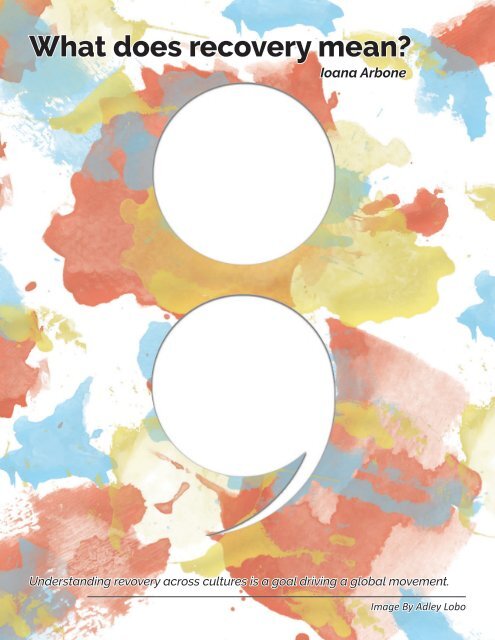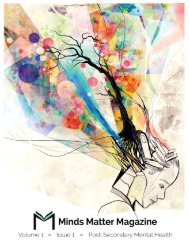Culture & Identity
Create successful ePaper yourself
Turn your PDF publications into a flip-book with our unique Google optimized e-Paper software.
What does recovery mean?<br />
Ioana Arbone<br />
Minds Matter Magazine Volume III Issue I <strong>Culture</strong> & <strong>Identity</strong><br />
One of the most popular ideas in mental<br />
health is something that we can hardly define<br />
- recovery.<br />
Our ideas of recovery seem to constantly<br />
change. Recovery is now part of international<br />
and Canadian policy on mental<br />
health. Yet it is difficult to understand what<br />
recovery is. The idea varies across mental<br />
illnesses, addictions and treatment methods.<br />
Across the world, there are different<br />
answers to these questions: What does it<br />
mean to recover from mental illness or addiction?<br />
How can people recover from mental<br />
illness or addiction? And even, can people<br />
recover from mental illness or addiction?<br />
Studies in the 1970s showed that<br />
most individuals diagnosed with schizophrenia<br />
go on to live meaningful and productive<br />
lives. This idea is at the core of the recovery<br />
movement. One of the achievements of the<br />
recovery movement is the integration of people<br />
with lived experience as part of the overall<br />
mental health and addiction system, and<br />
training opportunities for mental health and<br />
addiction staff to learn about recovery. Some<br />
of the movement’s values are less murky. In<br />
the recovery movement, “recovery” does not<br />
mean symptoms or struggles disappear forever.<br />
It means personal or psychological recovery<br />
- learning to lead a meaningful life, while<br />
still living with mental illness and its symptoms.<br />
Understanding revovery across cultures is a goal driving a global movement.<br />
Image By Adley Lobo<br />
The pursuit of definitive answers to<br />
these questions have given rise to the recovery<br />
movement. The recovery movement is a<br />
social movement working to change understanding<br />
of mental illness across the world,<br />
according to Larry Davidson, a Yale University<br />
professor and author of Roots of the Recovery<br />
Movement.<br />
It is not clear specifically how or where<br />
the recovery movement developed, but Davidson<br />
says that the recovery model is very<br />
Western, and focuses on the individual. He<br />
says we need to be mindful of other cultures<br />
who are focused more on the community<br />
than the individual.<br />
“One of the shortcomings of the concept<br />
of recovery and the recovery movement<br />
is that it’s hazy,” says Sean Kidd, a clinical<br />
psychologist with the Centre for Addiction<br />
and Mental Health.<br />
In this, recovery includes focusing on<br />
strengths, while acknowledging weaknesses.<br />
It encourages people to take calculated risks<br />
towards leading a meaningful life.<br />
(Wellbeing, Recovery and Mental Health,<br />
Chapter 9, page 102)<br />
Recovery lies in decreasing and preventing<br />
symptoms or unwanted behavior,<br />
while increasing and promoting wellbeing<br />
and strengths. Studies have supported the<br />
benefit of focusing on strengths instead of<br />
avoiding things that trigger symptoms - including<br />
in mental health services.<br />
13






